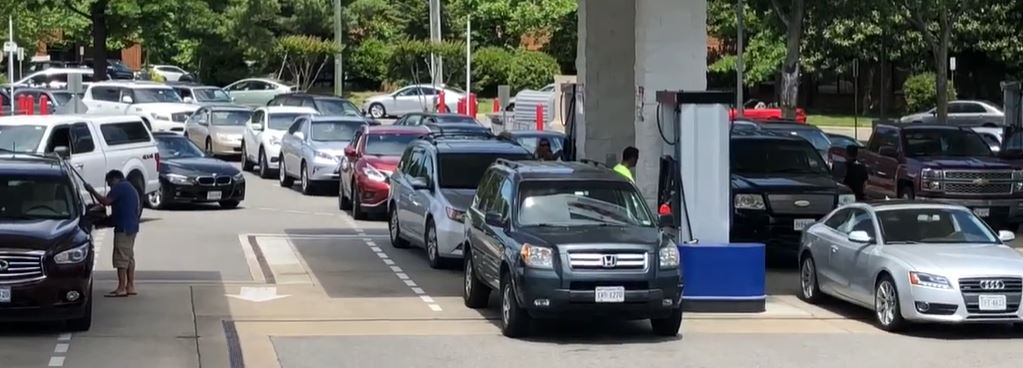by James A. Bacon
As panic buying sends Virginians to the gas pumps to top off their tanks, Attorney General Mark Herring is encouraging citizens to report instances of price gouging.
“This ransomewear (sic) attack on the Colonial Pipeline could create disruptions in the gasoline supply across the Commonwealth, and unfortunately, bad actors could take advantage of this just to line their own pockets,” said Attorney General Mark Herring in a press release. “Virginians should not have to worry about paying exorbitant prices for gas and other necessary goods during this time.”
Herring encouraged Virginians to file complaints with the Department of Agriculture and Consumer Services.
This is the absolute worst possible thing the state can do. Economics 101: During times like this, prices should rise.
The Colonial Pipeline expects to take a week or so to restore service after its ransomware attack. The supply of gasoline in Virginia, as in several other states, will be severely constrained. Panic buying has set in. Rather than drive around with gas tanks only half full on average, people are freaking out and topping off their tanks “just to be safe.”
There are roughly 3.2 million registered automobiles in Virginia. If the size of the average automobile gas tank is about 16 gallons, the implied unused storage capacity of Virginia’s automobile fleet is about 25 million gallons, give or take. Given that Americans consume about 390 million gallons of gasoline daily, we can estimate that Virginians, comprising roughly 1/40th of the national population, consume about 10 million gallons a day.
In other words, if everyone panics and keeps their gas tanks topped off, one to two days’ worth of gasoline consumption will be stored unused in peoples’ gasoline tanks. Panic buying aggravates the gas shortage, and people who really need the gasoline — to, say, drive back and forth to work — often can’t get it.
A rational response to this temporary emergency would be to let gasoline prices rise. That would do things. First, it would increase the cost of “hoarding.” People capable of nursing the gasoline in their tanks through a week-long disruption would think twice about keeping their gas tanks filled to the brim at $7 a gallon. In that way, higher prices would free gasoline supplies for people who really need it and are willing to pay a premium for it.
Higher prices would have a second benefit. They would encourage the importation of gasoline from other states by means other than pipelines. If someone could sell gasoline at a wholesale price of $6 a gallon instead of $2 a gallon (to pick numbers out of a hat for purposes of illustration), it might pay him to drive a gasoline rig to Virginia from West Virginia, Pennsylvania or Ohio.
Governor Ralph Northam acknowledged the option of delivering gas by truck in his Declaration of a State of Emergency issued in response to the pipeline shutdown.
While current gasoline reserves in the Commonwealth are sufficient to address immediate supply concerns, a long-term disruption in the pipelines will require transportation of fuel and other oil-derivatives via interstate and state roadways.
According to the AG’s press release, price gouging entails the charging of “unconscionable” prices. “The basic test for determining if a price is unconscionable, is whether the post-disaster price grossly exceeds the price charged for the same or similar goods or services during the ten days immediately prior to the disaster.”
In our current circumstance, it makes no sense whatsoever to suppress prices. This is economic illiteracy on steroids. Jawboning gasoline prices downward will aggravate the shortages and intensify the economic disruption.



